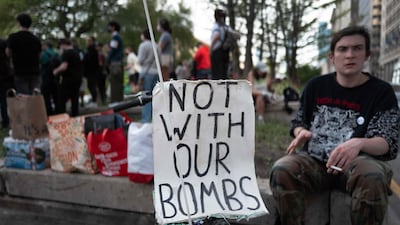Live updates: Follow the latest on Israel-Gaza
Protests at US universities have wound down in recent days after administrators agreed to some of the pro-Palestinian students' demands, including that colleges review their investments in Israel or with arms makers seen to be profiting from the war in Gaza.
The agreements at universities including Brown, Northwestern and Rutgers have been struck in the middle of chaotic scenes at other institutions, where more than 2,400 people have been arrested across 46 campuses nationwide since April 17, according to an AP tally.
The student protest movement, the largest since the days of the Vietnam War, has shone a spotlight on universities and how their multibillion-dollar endowments are invested.
Here is a look at what divestment means:
What is a university endowment?
An endowment is a pot of money and investments that academic institutions use for big expenditures and which provide financial stability.
The idea is that the principal sum in the fund lasts forever, while interest and returns on investments provide a steady income.
Some endowments are staggering: Harvard University has a nearly $50 billion endowment. For context, the entire gross domestic product of Jordan is about $49 billion.
What are the connections to Israel?
University endowment investments are complex, often with holdings in funds that support any number of companies, including some tied to the aerospace and defence industry.
On many campuses, students say they do not know the extent of the campus ties with Israel.
Yale University is one of many campuses where students are demanding transparency about investments.
The university does not make all of its investments public, and money can be hard to track after it goes to outside investment managers hired by colleges.
Activists in some places have identified specific ties that they want to end. Students at the University of Michigan said the school sends billions of dollars to investment managers that profit from the war.
They gave examples of investments in companies that produce drones and surveillance technology used in Israel.
Have universities divested before?
Campaigns to pressure universities to divest for political or ethical reasons go back decades, at least to the 1970s when students demanded that colleges withdraw from investments that benefited South Africa under apartheid rule.
This century, many universities barred investments in things such as alcohol, tobacco and gambling, according to a report from the National Association of College and University Business Officers and Commonfund.
Many endowments now include some environmental, social and governance criteria in their portfolios, which expands the factors in considering the value of an investment beyond profits and losses.
But divesting is no simple matter. Cutting ties with Israeli or defence-linked funds will probably lead to charges of anti-Semitism from critics of the student protests.











